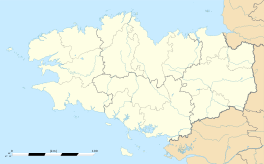L'Orient
|
Lorient An Oriant |
||
|---|---|---|

Aerial view of the harbour of Lorient
|
||
|
||
| Coordinates: 47°45′N 3°22′W / 47.75°N 3.36°WCoordinates: 47°45′N 3°22′W / 47.75°N 3.36°W | ||
| Country | France | |
| Region | Brittany | |
| Department | Morbihan | |
| Arrondissement | Lorient | |
| Intercommunality | Pays de Lorient | |
| Government | ||
| • Mayor (2008–2014) | Norbert Métairie | |
| Area1 | 17.48 km2 (6.75 sq mi) | |
| Population (2007)2 | 58,135 | |
| • Density | 3,300/km2 (8,600/sq mi) | |
| Time zone | CET (UTC+1) | |
| • Summer (DST) | CEST (UTC+2) | |
| INSEE/Postal code | 56121 / 56100 | |
| Elevation | 0–46 m (0–151 ft) | |
|
1 French Land Register data, which excludes lakes, ponds, glaciers > 1 km² (0.386 sq mi or 247 acres) and river estuaries. 2Population without double counting: residents of multiple communes (e.g., students and military personnel) only counted once. |
||
1 French Land Register data, which excludes lakes, ponds, glaciers > 1 km² (0.386 sq mi or 247 acres) and river estuaries.
Lorient (French pronunciation: [lɔ.ʁjɑ̃]; Breton: An Oriant) is a commune and a seaport in the Morbihan department in Brittany in north-western France.
Beginning around 3000 BC, settlements in area of Lorient are attested by the presence of megalithic architecture. Ruins of Roman roads (linking Vannes to Quimper and Port-Louis to Carhaix) confirm Gallo-Roman presence.
In 1664, Jean-Baptiste Colbert founded the French East Indies Company. In June 1666, an ordinance of Louis XIV granted lands of Port-Louis to the company, along with Faouédic on the other side of the roadstead. One of its directors, Denis Langlois, bought lands at the confluence of the Scorff and the Blavet rivers, and built slipways. At first, it only served as a subsidiary of Port-Louis, where offices and warehouses were located. The following years, the operation was almost abandoned, but in 1675, during the Franco-Dutch War, the French East Indies Company scrapped its base in Le Havre since it was too exposed during wartime, and transferred its infrastructures to l'Enclot, out of which Lorient grew. The company then erected a chapel, workshops, forges, and offices, leaving Port-Louis permanently.
...
Wikipedia



